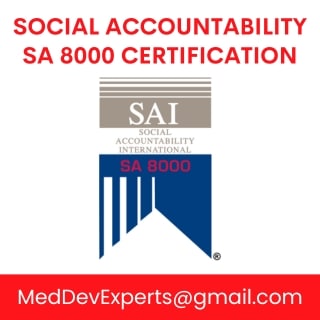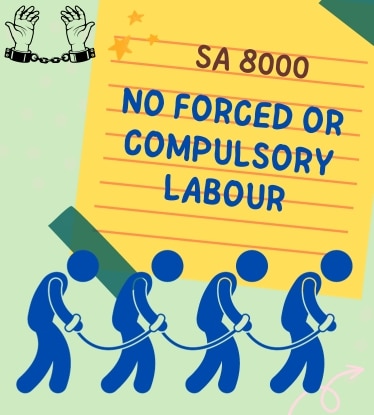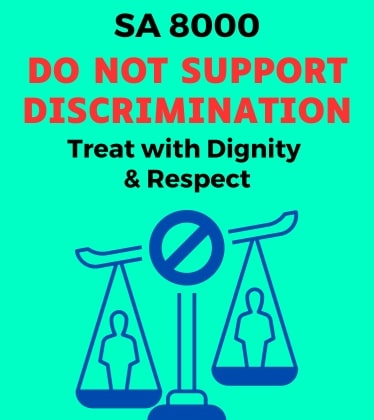Social Accountability SA 8000 Certification in Baddi, India
SA 8000 Certification is a globally recognized standard for social accountability in the workplace. It sets the benchmark for ethical business practices, emphasizing fair treatment of workers, safe working conditions, and respect for human rights. SA 8000 helps organizations demonstrate their commitment to workers’ rights and well-being.
If you are interested in learning more about SA 8000 certification and how to get certified, please contact us today.
Child Labour
SA 8000 requires organizations to protect children and young workers from exploitation and harm. It also recommends the organization comply with the following:
- Organizations must not engage in or support the use of child labour.
- Organizations must have policies and procedures in place to identify and remediate child labour cases.
- Organizations may employ young workers, but only outside of school hours and under strict restrictions on working hours and conditions.
- Organizations must not expose children or young workers to any hazardous or unsafe situations.
Forced or Compulsory Labour
SA 8000 requires organizations to respect workers’ freedom and autonomy and to protect them from forced labour. It also recommends the organization comply with the following:
- Organizations must not engage in or support the use of forced labor, including prison labor.
- Organizations must not retain original identification papers or require workers to pay deposits upon commencing employment.
- Organizations must not withhold any part of a worker’s salary, benefits, property, or documents in order to force them to continue working.
- Workers must not bear any employment fees or costs.
- Workers must have the right to leave the workplace after completing the standard workday and terminate their employment with reasonable notice.
- Organizations must not engage in or support human trafficking.
Health and Safety
SA 8000 requires organizations to provide a safe and healthy workplace environment for all personnel including the following:
- Organizations must provide a safe and healthy workplace environment and take steps to prevent accidents and injuries.
- Organizations must assess all workplace risks and provide personal protective equipment as needed.
- Organizations must appoint a senior management representative to be responsible for health and safety and establish a health and safety committee.
- Organizations must provide regular health and safety training to personnel.
- Organizations must establish procedures to detect, prevent, and respond to potential health and safety risks.
- Organizations must provide free access to clean toilet facilities, potable water, and suitable meal breaks.
- Organizations must ensure that any dormitory facilities provided are clean, safe, and meet basic needs.
- All personnel have the right to remove themselves from imminent serious danger without seeking permission from the organization.
Freedom of Association and Right to Collective Bargaining
SA 8000 requires organizations to respect workers’ freedom of association and collective bargaining rights. It also recommends the organization comply with the following:
- All personnel have the right to form, join, and organize trade unions of their choice and to bargain collectively with the organization.
- The organization must not interfere with the establishment, functioning, or administration of workers’ organizations or collective bargaining.
- The organization must allow workers to freely elect their own representatives.
- The organization must ensure that union members, representatives of workers, and any personnel engaged in organizing workers are not subjected to discrimination, harassment, intimidation, or retaliation.
Discrimination
SA 8000 requires organizations to treat all workers with dignity and respect, regardless of their background or beliefs. It also recommends the organization comply with the following:
- Organizations must not engage in or support discrimination in any form.
- Organizations must not interfere with the exercise of workers’ rights to observe their tenets or practices or to meet their needs related to race, national origin, religion, disability, gender, sexual orientation, family responsibilities, union membership, political opinions, or any other condition that could give rise to discrimination.
- Organizations must not allow any threatening, abusive, exploitative, or sexually coercive behaviour in the workplace.
- Organizations must not subject workers to pregnancy or virginity tests under any circumstances.
Disciplinary Practices
SA 8000 requires organizations to create a workplace environment where all personnel feel safe and respected including the following:
- Organizations must treat all personnel with dignity and respect.
- Organizations must not engage in or tolerate the use of corporal punishment, mental or physical coercion, or verbal abuse of personnel.
- No harsh or inhumane treatment is allowed.
Working Hours
SA 8000 requires organizations to limit workers’ hours and ensure that they have adequate rest and time off. It also recommends the organization comply with the following:
- Organizations must comply with applicable laws, collective bargaining agreements, and industry standards on working hours, breaks, and public holidays.
- The normal work week, not including overtime, must not exceed 48 hours.
- Personnel must be provided with at least one day off following every six consecutive days of working.
- All overtime work must be voluntary.
- Overtime work must not exceed 12 hours per week and must not be requested on a regular basis.
Remuneration
SA 8000 requires organizations to pay workers fairly and in accordance with all applicable laws and regulations including the followings.
- Organizations must pay workers a living wage that meets at least legal or industry minimum standards, or collective bargaining agreements.
- Organizations must not make deductions from wages for disciplinary purposes, unless permitted by national law and a freely negotiated collective bargaining agreement.
- Organizations must provide workers with a clear and regular breakdown of their wages and benefits in writing for each pay period.
- Organizations must pay overtime at a premium rate as defined by national law or a collective bargaining agreement, or at a premium rate equal to prevailing industry standards, whichever is higher.
Management System
The SA8000 standard requires organizations to establish a management system to implement and maintain the requirements of the standard. This includes developing policies and procedures, conducting risk assessments, monitoring workplace activities, communicating with personnel, establishing a grievance procedure, cooperating with external auditors, engaging with stakeholders, taking corrective and preventive actions, providing training, and managing suppliers and contractors.
Who is eligible to get SA 8000 Certification?
It is universally applicable to every type of organisation, regardless of its size, geographic location or industry sector. It is a voluntary standard based on the UN Declaration of Human Rights, ILO and other international human rights and labour norms and national labour laws.
Benefits of SA 8000 certification
There are many benefits to getting SA 8000 certification, including:
- Demonstrate Commitment: Showcase your dedication to ethical labor practices and social responsibility.
- Improve Working Conditions: Create a safer, healthier, and more productive workplace.
- Protect Workers’ Rights: Ensure fair wages, reasonable working hours, and respect for employee rights.
- Improved reputation: Improves your reputation among customers, suppliers, and investors as a committed organization for workers’ rights and well-being.
- Increased sales: Many consumers are willing to pay a premium for products and services from companies that are SA 8000 certified.
- Meet Legal Requirements: SA 8000 certification can help to reduce your risk of labor disputes and regulatory problems.
How to get SA 8000 certification?
There are a few steps you need to take to get SA 8000 certification:
- Consultation: We begin by understanding your organization’s specific requirements and current practices.
- Gap analysis: Our experts identify areas that need improvement to meet SA 8000 standards.
- Implementation: We help you implement necessary changes to align with certification requirements.
- Audit: Our auditors conduct a thorough examination of your processes and practices.
- Certification: Upon successful completion of the audit, an SA 8000 Certificate will be issued.
MedDev Experts offers a streamlined certification process tailored to your unique needs. Our team of experts will guide you through every step, from consultation to certification, ensuring a smooth and efficient journey to SA 8000 Certification.
Book a
FREE CONSULTATION
If you are interested in getting SA 8000 certified in India, please contact us today. We would be happy to help you through the process. Our dedicated team is here to answer your questions, provide guidance, and support you throughout the certification process.
Phone
+91-78079-14459











